Pocket Option Uk
Welcome to binary options . All or nothing, one or zero, these securities are available on Nadex Pocket Option Order Block . Binary options allow traders to make time-bound conditional bets on predefined values of stock indices, forex, commodities, and events . Like a standard exchange traded option, each binary option has an option premium ($45, $81, and $77 in the examples above), a pre-determined strike price ($1,700, 8600 points, and 108 yen), and an expiry (1:30 p.m., 2 p.m., 3 p.m . today).
What is better than PocketApp? Explore other competing options and alternatives. Other important factors to consider when researching alternatives to Pocket include features and content. The best overall Pocket alternative is Toby. Other similar apps like Pocket are Raindrop.io, Diigo, start.me, and Bookmark Ninja.
Do you need 25k to day trade options? The $25k requirement for day trading is a rule set by FINRA. It's designed to protect investors from the risks of day trading. By requiring a minimum equity of $25k, FINRA ensures that investors have enough capital to absorb potential losses. But remember, even with $25k, day trading is still a high-risk activity.
The differentiator is the settlement price that remains fixed at $0 or $100, depending on the option condition being fulfilled. It keeps the net profit (or loss) fixed. The option premium also remains between $0 and $100. (Related: Guide to trading binary options.)
Introduction Pocket Option Uk
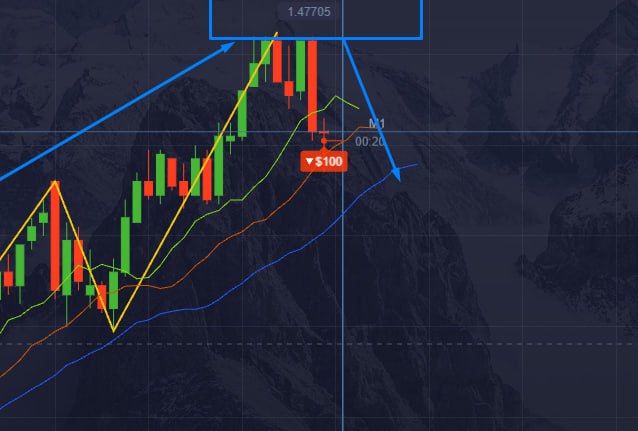 Since binary options are time-bound and condition-based, probability calculations play an important part in valuing these options Pocket Option Broker Review . It all boils down to “What is the probability that the current gold price of $1,220 will move to $1,250 or above in the next four hours?" The determining factors include:
Since binary options are time-bound and condition-based, probability calculations play an important part in valuing these options Pocket Option Broker Review . It all boils down to “What is the probability that the current gold price of $1,220 will move to $1,250 or above in the next four hours?" The determining factors include:
- Volatility (how much, and is it sufficient to cross the threshold/strike price?)
- The direction of the price move
- Timing
Technical indicators suitable for binary options trading should incorporate the above factors. One can take a binary option position based on spotting continued momentum or trend reversal patterns. Let’s look at some of the popular binary option technical indicators.
Wilder's DMI (ADX)
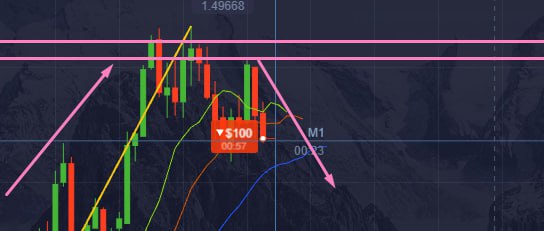
Composed of three lines, namely ADX, DI+, and DI-, and their relative positions, Wilder's Directional Movement Indicators (DMI) Average Directional Index (ADX) aims to capture the strength of an already identified trend. Below is the table for interpreting the trends.
Position
Momentum
ADX Value > 25
Weak, Unsustainable Uptrend
Weak, Unsustainable Downtrend
Here is an illustration, using 3M Company (MMM) stock:
Image by Sabrina Jiang © Investopedia 2021Depending upon the identified momentum and trend strength, an appropriate buy/sell position could be taken.
Pivot Point
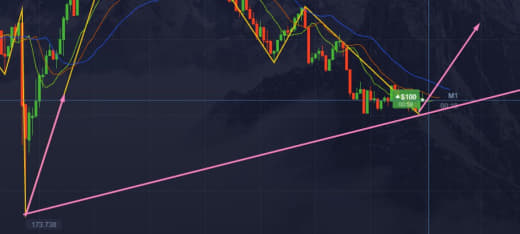
Pivot point analysis (in conjunction with support and resistance levels) helps determine trends and directions for any given timeframe. Because of the flexibility in timing, pivot points can be used for binary options, particularly for trading highly liquid major currencies. A good example (with calculation and graphs) is included in Using Pivot Points in Forex Trading.
Commodity Channel Index (CCI)
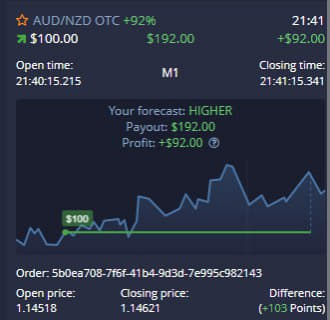
The CCI calculates the current price level of a security relative to the average price during any given timeframe. The average price level is usually the moving average. Time periods can be selected as desired, allowing the trader flexibility in choosing when a binary option expires. The CCI is useful in identifying new trends and extreme conditions of overbought/oversold securities.
It is very popular among day traders for short-term trading and may be used with additional indicators such as oscillators. In the below formula "price" is the asset's current price, "MA" is the moving average of the asset's price, and "D" is the normal deviation from that average. High values above +100 indicate the start of a strong uptrend. Values below -100 indicate the start of a strong downtrend. The CCI is computed with the formula:
CCI = Price − MA 0.015 × D where: Price = asset’s current price MA = moving average of asset’s price D = normal deviation from moving average \begin &\text = \frac < \text- \text > < 0.015 \times \text> \\ &\textbf \\ &\text = \text \\ &\text = \text \\ &\text = \text \\ \end CCI = 0 . 0 1 5 × D Price − MA where: Price = asset’s current price MA = moving average of asset’s price D = normal deviation from moving average
Stochastic Oscillator
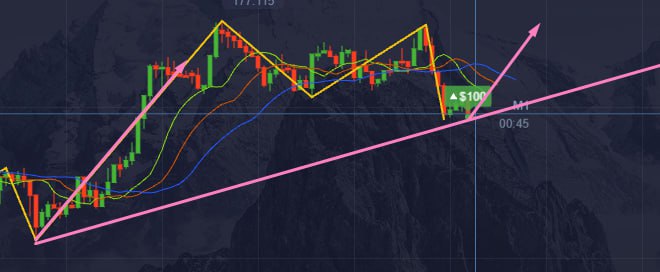
In an interview, the creator of the Stochastic Oscillator, Dr. George Lane, said “it follows the speed or the momentum of price. As a rule, the momentum changes direction before price.” This important underlying detail indicates extreme cases of overbuying and overselling, allowing reversals for bullish and bearish phases to be identified. The crossover of %K and %D values indicates trade entry signals. Although a 14-day period is standard, binary option traders can use their own desired timeframes.
%K = 100 ( C − L14 H14 − L14 ) where: C = most recent closing price L14 = low of 14 previous trading sessions H14 = highest price traded during same 14-day period \begin &\text = 100 \left ( \frac < \text- \text > < \text- \text > \right ) \\ &\textbf \\ &\text = \text \\ &\text = \text \\ &\text = \text \\ \end %K = 1 0 0 ( H14 − L14 C − L14 ) where: C = most recent closing price L14 = low of 14 previous trading sessions H14 = highest price traded during same 14-day period
%D = 3 period moving average of %K \begin &\text = \text \\ \end %D = 3 period moving average of %K
Levels above 80 indicate overbought, while those below 20 indicate oversold.
Image by Sabrina Jiang © Investopedia 2021Bollinger Bands
Bollinger bands capture an important aspect of volatility. They identify upper and lower levels as dynamically generated bands based on recent price moves of a security.
Image by Sabrina Jiang © Investopedia 2021Commonly followed values are 12 for simple moving average and two for a standard deviation for top and bottom bands.
Contraction and expansion of the bands indicate reversal signals that help traders take appropriate positions in binary options. Overbought situations are indicated if the current market price is above the top band. While overselling is indicated when the current market price is lower than the lower band.
A challenge in binary options trading is correctly predicting the sustainability of a trend over a given period. For example, a trader may take the right position for an index, predicting it would hit 1,250 at the end of a five-hour period, but the level was achieved in the first two hours. Constant monitoring is needed for the rest of the three hours if the trader plans to hold the position until expiry, or a predetermined strategy should be executed (like squaring off the position) once the level is reached.
The Bottom Line
The technical indicators discussed above should be used for timely actions with constant monitoring. One major disadvantage with technical indicators is that the results and calculations are based on past data and can generate false signals. Traders should practice caution with detailed backtesting and thorough analysis for high-risk, high-return assets like binary options.